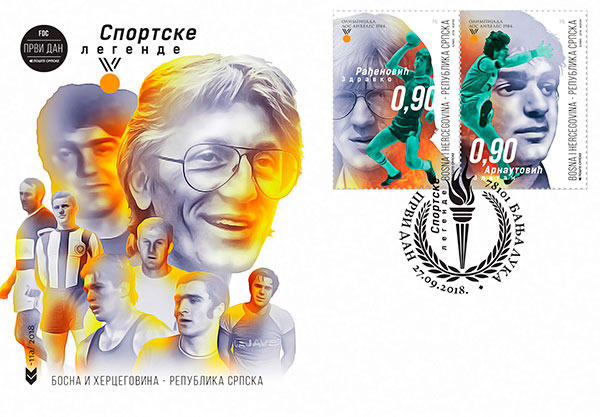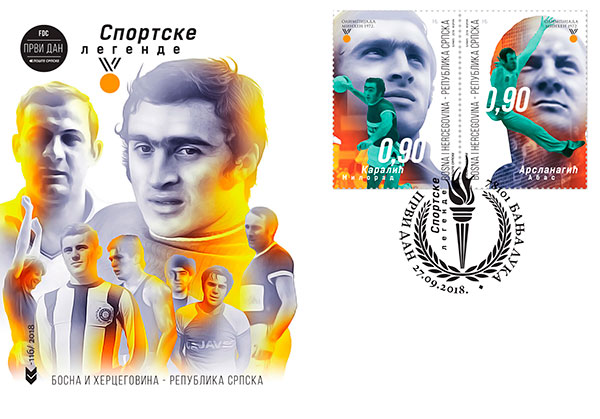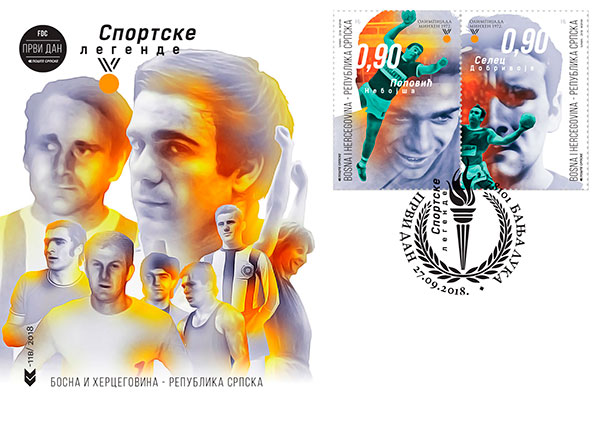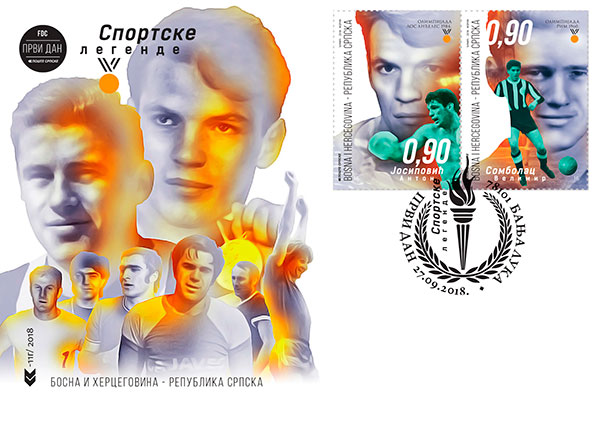Sports legends
Title::Sports legends
Date of Issue:27.09.2018.
Author:Nebojsa Djumic
Type edition:commemorative
Printing techniques:multicolour offset
Sheet:8+1
Paper:muflep 100g
Printing House:Forum, Novi Sad
 Motive:Velimir Sombolac
Motive:Velimir Sombolac
Catalogue no.:774
Perforation:13 3/4
Face value:0.90 BAM
Quantity:15 000
 Motive:Abas Arslanagic
Motive:Abas Arslanagic
Catalogue no.:775
Perforation:13 3/4
Face value:0.90 BAM
Quantity:15 000
 Motive:Добривоје Селец
Motive:Добривоје Селец
Catalogue no.:776
Perforation:13 3/4
Face value:0.90 BAM
Quantity:15 000
 Motive:Nebojsa Popovic
Motive:Nebojsa Popovic
Catalogue no.:777
Perforation:13 3/4
Face value:0.90 BAM
Quantity:15 000
 Motive:Anton Josipovic
Motive:Anton Josipovic
Catalogue no.:778
Perforation:13 3/4
Face value:0.90 BAM
Quantity:15 000
 Motive:Zlatan Arnautovic
Motive:Zlatan Arnautovic
Catalogue no.:779
Perforation:13 3/4
Face value:0.90 BAM
Quantity:15 000
 Motive:Zdravko Radjenovic
Motive:Zdravko Radjenovic
Catalogue no.:780
Perforation:13 3/4
Face value:0.90 BAM
Quantity:15 000
 Motive:Milorad Karalic
Motive:Milorad Karalic
Catalogue no.:781
Perforation:13 3/4
Face value:0.90 BAM
Quantity:15 000

The Olympic Games are the leading international sports event competing with thousands of athletes around the world. Every two years, the Olympic Games allow unknown athletes to gain national and international fame, to present their country, their city.
With this postage stamp, we just want to pay tribute to the people, the giants of sport who celebrated our sporting places and especially the city of Banja Luka with their sporting performances. These are our handball players, footballers, boxers ...
The first gold from the Olympics, in the town of Vrbas, came from Rome in 1960.
In honor of these sports and human sizes, in the sports hall "Borik" at the entrance to the parquet floor there is the "Olympic Arch", and they are:
Zdravko Radjenovic started playing handball in 1966 in his hometown (Backa Palanka) in RK Tekstilac. Then he also performed for the Sintelona team from Backa Palanka. He came to RK Borac in 1973. With Borac Radjenovic was four times the champion of Yugoslavia and four times the winner of the Cup of Yugoslavia. In the final match for the European championship, when Borac beat Danish Fredericia, Radjenovic was the top scorer with six goals scored. He is one of the best golgeters in Borac, for which he performed for ten years. His feint became known in the handball world. The Swedes call this feint kuglager-feint (in Swedish: kullagerfint), and the Danes are even more explicit - they call this feint by Radjenovic's. For the best selection of Yugoslavia he played 137 times and gave 369 goals. The highlight of his career is the 1984 Olympic gold medal in Los Angeles. He was then the captain of the national team of Yugoslavia. Radjenovic is also the winner of two more medals: one silver and one bronze, both from the world championship. After sneaking his sneakers on the wedge, Radjenovic for a long time transferred his rich experience to Borac players.
Zlatan Arnautovic handball player from Prijedor, where he started a handball career, which he later continued in RC Borac from Banja Luka. He played in the goalkeeper's position.
Zlatan Arnautovic Zlaja is a true successor to Arslanagic, who was also his coach. This 194 centimeters tall and corpulent goalkeeper was fear and trembling for the pitchers. With Borac he won the title of the European Handball Federation Cup winner in 1991. His share in that title was really great, his experience was an inspiration for young team of Borac. He was a goalkeeper for the national team of Yugoslavia in 157 matches. At Olympic Games in Los Angeles in 1984 he won Olympic gold. Two years later, in 1986, he was awarded the medal of the same glory, this time from the World Cup (Switzerland). Arnautovic was then declared the best goalkeeper thanks to a truly brave defense.
Author: Nebojsa Djumic
Publisher: Poste Srpske a.d. Banjaluka
Cooperation: Handball club “Borac” Banjaluka

The Olympic Games are the leading international sports event competing with thousands of athletes around the world. Every two years, the Olympic Games allow unknown athletes to gain national and international fame, to present their country, their city.
With this postage stamp, we just want to pay tribute to the people, the giants of sport who celebrated our sporting places and especially the city of Banja Luka with their sporting performances. These are our handball players, footballers, boxers ...
The first gold from the Olympics, in the town of Vrbas, came from Rome in 1960.
In honor of these sports and human sizes, in the sports hall "Borik" at the entrance to the parquet floor there is the "Olympic Arch", and they are:
Milorad Karalic handball player from the 1970 of the 20th century. He is ann authentic outgrowth of the School of Handball ‘’Borac’’. He was very young when he played for the first team.
For the first time, he represented the SFR Yugoslavia in 1967. The cup that belongs to the champion of Europe he received in 1976. Karalic was the captain of the team. This racial shooter played for RK Borac, who never left, even 373 games and scored 1.558 goals, which is on average more than four goals per game. In 128 matches in the national team of Yugoslavia, he scored 181 goals. He won the Olympic gold medal in Munich in 1972 and the bronze medal at the 1970 World Cup, held in France. Karalic, after finishing his career, remained faithful to his Borac, performing professional functions at the club.
Abas Arslanagic started handballing at age 14 in his hometown of Derventa, and four years later he started his professional career in Partizan. Shortly thereafter, he came to Banja Luka where a new generation and team were created, with which he would win many titles, including the title of European champion in 1976. He played for Borac officially for 232 matches, where he scored 18 goals as a goalkeeper. He won 4 national championships and 5 cups in the former country with the club. He played for Yugoslavia in 1969 in Ljubljana against Germany, for which he will play 125 games in total. In addition to the gold medal at the Olympics in Munich in 1972, he won two bronze medals at the World Championships in 1970 and 1974.
Arslanagic is known for bringing some news in a way to defend a handball goal. When defending his heptameter, he began to leave the line at three meters where he would raise his hands above his head. He also used it when defending from the wings to reduce the angle to which the ball could be directed. He was a specialist in defending heptameter. And the other goalkeepers have applied some of his techniques that are still in use today.
Author: Nebojsa Djumic
Publisher: Poste Srpske a.d. Banjaluka
Cooperation: Handball club “Borac” Banjaluka

The Olympic Games are the leading international sports event competing with thousands of athletes around the world. Every two years, the Olympic Games allow unknown athletes to gain national and international fame, to present their country, their city.
With this postage stamp, we just want to pay tribute to the people, the giants of sport who celebrated our sporting places and especially the city of Banja Luka with their sporting performances. These are our handball players, footballers, boxers ...
The first gold from the Olympics, in the town of Vrbas, came from Rome in 1960.
In honor of these sports and human sizes, in the sports hall "Borik" at the entrance to the parquet floor there is the "Olympic Arch", and they are:
Nebojsa Popovic is another handball player from Prijedor who was less than 16 years old when he debuted for the Borac Handball Club. Twenty years old he played in Borac. He is the best scorer in the club - in some 400 matches he scored nearly 1,700 goals. He also has the most club titles in Borac, with which he won as many as five titles of the champions of Yugoslavia and six titles of the winners of the Cup of Yugoslavia. He was, of course, also in the Borac team that won the title of European champions. In Borac he played only at the place of pivotman and he never had a reserve in the team. For the national team of Yugoslavia, he played 115 matches and scored 252 goals. With the representation of Yugoslavia, he won the golden medal in Munich. He has two bronze medals from the world championship. Like Arslanagic, he was twice in the world representation. Popovic is a living example that sport and science can go hand in hand, because he also holds the title of Doctor of Medical Science.
Dobrivoje Selec handball player from Varazdin, unfortunately, is no longer among us. But what he did in the world of handball will remain permanently written. He came to Banja Luka in a relatively senior game period and immediately became her favorite - not just for handball. Selec was lefthanded. He had a tremendous shot, and goals were often scored from positions that were not logical to the shot. That's why he made a lot of decisive goals. In the Borac titles of the champions of Yugoslavia and the winners of the Cup of Yugoslavia, this is the most beneficial man from Varazdin. For the best squad of Yugoslavia he played 22 matches and scored 18 goals. He won the Olympic gold medal from Munich in 1972.
Author: Nebojsa Djumic
Publisher: Poste Srpske a.d. Banjaluka
Cooperation: Handball club “Borac” Banjaluka

The Olympic Games are the leading international sports event competing with thousands of athletes around the world. Every two years, the Olympic Games allow unknown athletes to gain national and international fame, to present their country, their city.
With this postage stamp, we just want to pay tribute to the people, the giants of sport who celebrated our sporting places and especially the city of Banja Luka with their sporting performances. These are our handball players, footballers, boxers ...
The first gold from the Olympics, in the town of Vrbas, came from Rome in 1960.
In honor of these sports and human sizes, in the sports hall "Borik" at the entrance to the parquet floor there is the "Olympic Arch", and they are:
Anton Ante Josipovic boxer from Banja Luka, won his first Yugoslavian championship in 1982. He became Balkan champion in 1983.
At the 1984 Olympics in Los Angeles, he became the first Yugoslav athlete to win a gold medal without a fight. Josipovic was left without an opponent, after Yugoslav referee Gligorije Novicic disqualified American boxer Evander Holyfield in the second semi-final fight against New Zealand's Kevin Berry after he struck (and knocked out) the opponent after the referee's sign to end the fight.
When receiving the gold medal, Josipovic called Hollyfild to the podium and earned ovations, and thus showed that he was a great athlete and a man.
Velimir Sombolac, a footballer who during his club career played for FC Borac Banja Luka, FC Partizan, FC Olimpija and FC Orijent. Although he always said that he is the fan of Partizan's "eternal" rivals of the Red Star, he still made a brilliant career in the "black and white" dress he was wearing from 1959 to 1965. He won the Yugoslav championship with Partizan four times. In the Partizan dress, he also played the quarter-finals of the European Champions Cup in 1964. He performed for the younger Yugoslavia's selection until 1959. With a national team he won a gold medal at the 1960 Olympic Games in Rome. Unfortunately, he is no longer among us, but his sporting talents will always be remembered. He finished his rich gaming career in Borac in 1973.
Author: Nebojsa Djumic
Publisher: Poste Srpske a.d. Banjaluka
Cooperation: Handball club “Borac” Banjaluka
 1371
1371  kontakt@postesrpske.com
kontakt@postesrpske.com


